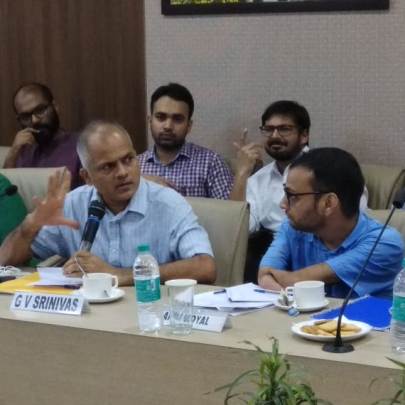  “The industry will need to adjust to increased cost of data mirroring mandate as its greater benefits are likely to follow”, G.V. Srinivas, Joint Secretary, Cyber Diplomacy, Ministry of External Affairs, Government of India, Mr. Srinivas was speaking at a roundtable entitled Consumer Sovereignty in the times of Data Localisation, organised by CUTS International. He pointed out that the Data Protection Bill by Srikrishna Committee has made genuine efforts to be sensitive to consumer rights. He noted that access to important data by law enforcement agencies is likely to be made easier under the proposed regime.
Dr. Usha Ramanathan, Legal Researcher and Consumer Rights Activist, noted that basis for government to demand data localisation is not clear as the government is unlikely to provide heightened security and data protection standards to consumers. Nikhil Pahwa, Founder, Medianama, pointed out that mandatory data localisation provisions are likely to create artificial distinctions between large and small businesses and adversely impact the latter. He also highlighted that India does not have necessary infrastructure to support large-scale data centers in the country.
Venkatesh Krishnamoorthy, Country Manager, The Software Alliance, added that consumers should be free to choose jurisdiction in which data can be stored, and different options could appear as a drop down menu to enable consumer choice. Shagufta Kamran, USISPF, noted that Indian information technology and enabled industry has traditionally benefitted from cross border data flow and it might not be a good idea to restrict such flows. Amitayu Sengupta, IAMAI, pointed out that setting up data centers is resource intensive and requires significant capitalization and consequently has been avoided in the past.
Smriti Parsheera, Legal Consultant, National Institute of Public Finance and Policy noted that it might not be prudent to force localisation but businesses should be free to choose the most cost effective and technically efficient geography to store data. She also pointed out the need for conducting rigorous cost-benefit analysis, which takes into account civil liberties perspective, to determine the best way forward on regulation of data flows. Prasanna, Supreme Court advocate, pointed out that localised data is likely to be used in trade wars, which should not ideally be the case. Kazim Rizvi, Founder, The Dialogue, suggested that India needs to be more active in strengthening bilateral treaties to address genuine government concerns of access to data stored outside its jurisdictions by law enforcement agencies. In case data localisation becomes reality, due process of law will need to be enshrined to ensure proper checks and balances for access to data. Infrastructure needs to be upgraded in form of uninterrupted access to electricity and internet and physical security of data is also important. It was pointed out that access to law enforcement agencies can be enabled through compliance with legislations like the CLOUD Act in the US. However, this will require amendments in existing legislation like the Information Technology Act and related rules.
While highlighting consumer concerns on the issue, Ashim Sanyal, VOICE, pointed out that data localisation is anti-consumer from the point of view of quality and cost of services and it is unlikely to help in data protection. Jyoti Panday, Cashless Consumer, pointed out that state’s claim on sovereignty is seemingly trumping consumer rights.
The roundtable saw rich participation from different stakeholders including government, industry, consumer groups, academia, and data protection experts.
The participants agreed that the roundtable was a good opportunity to discuss and debate divergent viewpoints on data protection in general and data localisation in specific. Taking forward such discussions is necessary to create a shared vision of digital economy in which different stakeholder interests can co-exist. The discussion needs to be informed throughmulti-disciplinary and integrated approach. |